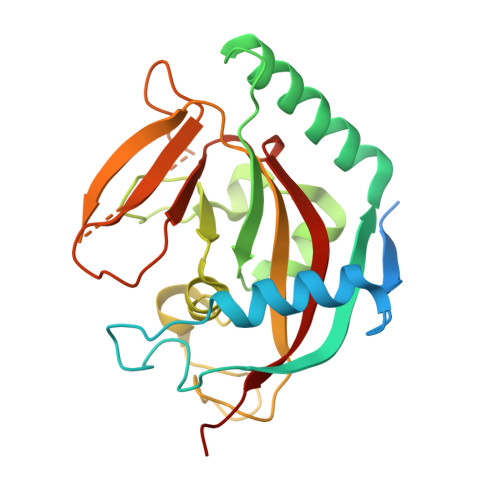Para-Substituted 2-Phenyl-3,4-Dihydroquinazolin-4-Ones as Potent and Selective Tankyrase Inhibitors.
Haikarainen, T., Koivunen, J., Narwal, M., Venkannagari, H., Obaji, E., Joensuu, P., Pihlajaniemi, T., Lehtio, L.(2013) ChemMedChem 8: 1978
- PubMed: 24130191
- DOI: https://doi.org/10.1002/cmdc.201300337
- Primary Citation of Related Structures:
4BU3, 4BU5, 4BU6, 4BU7, 4BU8, 4BU9, 4BUA, 4BUD, 4BUE, 4BUF, 4BUI, 4BUS, 4BUT, 4BUU, 4BUV, 4BUW, 4BUX, 4BUY - PubMed Abstract:
Human tankyrases are attractive drug targets, especially for the treatment of cancer. We identified a set of highly potent tankyrase inhibitors based on a 2-phenyl-3,4-dihydroquinazolin-4-one scaffold. Substitutions at the para position of the scaffold's phenyl group were evaluated as a strategy to increase potency and improve selectivity. The best compounds displayed single-digit nanomolar potencies, and profiling against several human diphtheria-toxin-like ADP-ribosyltransferases revealed that a subset of these compounds are highly selective tankyrase inhibitors. The compounds also effectively inhibit Wnt signaling in HEK293 cells. The binding mode of all inhibitors was studied by protein X-ray crystallography. This allowed us to establish a structural basis for the development of highly potent and selective tankyrase inhibitors based on the 2-phenyl-3,4-dihydroquinazolin-4-one scaffold and outline a rational approach to the modification of other inhibitor scaffolds that bind to the nicotinamide site of the catalytic domain.
Organizational Affiliation:
Department of Biochemistry and Biocenter Oulu, 90014 University of Oulu, PO Box 3000 Oulu (Finland).


















